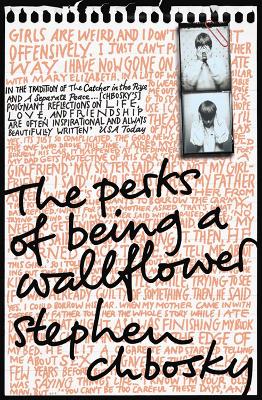Reviewed by KitsuneBae on
Before anything else, I’d like to inform you that the sole reason I’ve read this book is that it was sent to me by my sister as a surprise gift—it wasn’t my birthday though—and I don’t have the heart to ignore it knowing that she paid a significant amount for its shipping.
I don’t have any problem reading epistolary novels. In fact, Daddy Long Legs and the Diary of a Wimpy Kid are favorites of mine. But this book, The Perks of Being a Wallflower, has made it into my list of most hated books for 2013. I don’t care if it has been made into a movie or Emma Watson was the star. It was dry and dismal… absolutely unconvincing about the coming-of-age thingy. You wanna know why? Read on, bloggy friends.
So we are introduced to the life of Charlie and how he came out of his shell when he befriended a senior named Patrick and eventually, the latter’s sister, Sam. And then Charlie saw the world of how it is being in high school with the wild parties, drug use, premarital sex, violence, and shallow relationships. In the middle of these experiences, Charlie is also keeping a dark secret of his childhood which has left him traumatized until his high school years.
So okay, I did understand what Stephen is trying to convey in this book. What I can’t understand is that why did he titled this one as the perks of being a wallflower? I’ve read the whole book and I’m sorry if I sound like a blabbering imbecile but I didn’t see what kind perks Charlie got after being a wallflower. The whole story just failed to connect to the title.
And there were the characters that were as boring as our old chopping board. Charlie was the most annoying of all. He seemed detached, clueless, naïve…a sort of person who was born yesterday. His teacher was all praises for him… being smart and all that. I can’t just get it because Charlie wasn’t smart at all… he likes reading and yet, it’s as if he’s not learning from all the books that he read with the way he’s acting. For goodness sake, he’s 15 years old but Stephen depicts him like an eight year old kid. He is even confused on how to handle his relationship with Mary Elizabeth like he completely had no idea on why he was in that kind of situation at all. Whatever. It turned out later that he’s a troubled kid after suffering from an abuse when he was a child. But that’s exactly my point, how can he act so naïve when he had experienced firsthand the ugliness of human nature? I would really love to dissect Charlie’s character in this review but I think that would give too many spoilers.
Aside from the wild parties, etc. that I’ve mentioned in the second paragraph, TPBW also included rape and gay relationships creating an enchilada of human ugliness. While I do appreciate those things being the subject of some books, I can’t bring myself to like this book for that. Clueless Stephen went throwing all those ingredients without thoroughly blending it with the whole story. It made the book one-sided. It did not delve into why or how the other teenagers got into that kind of mess. To put it simply, it was superficial and a mockery to those people who experienced being in those situations. Stephen definitely poked his nose into a subject matter that he clearly does not understand. Otherwise, he would have written this book with great cautiousness.
Stephen’s manner of writing TPBW was also mediocre which failed to transport me into the hellish world of teenage chaos. It was even very monotonous using the same words over and over again which is somewhat unbelievable if you think of Charlie being “a wide reader.” It lacked the right emotion and the X-factor to keep the readers aching for more.
As much as I would like waste my time to write a novella review for this book, I don’t think I could go on. TPBW has already used up a significant amount of my time with me reading it. There’s no way I’d spend that much for writing a review for this joke of a book. Enough is enough. Would I recommend this book? Sure, if you think being extremely annoyed is the perfect way to spend a glorious day.
Reading updates
- Started reading
- 1 January, 2013: Finished reading
- 1 January, 2013: Reviewed
